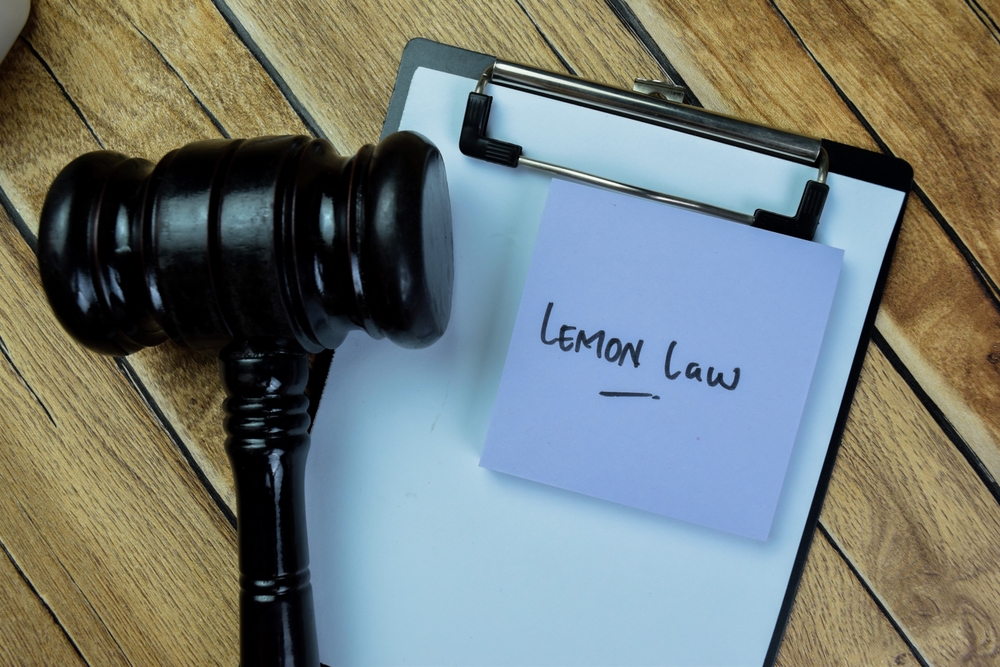
Consumers buy vehicles to enjoy certain qualities, including reliability, comfort, value for money, and convenience. Although it is a small percentage, some cars do not live up to the promise made by the automaker.
A new vehicle can develop a persistent defect that proves difficult for the manufacturer to fix. If you accidentally buy a lemon vehicle, you’ll incur additional expenses like towing fees, car rental, and accommodation charges.
In addition, you cannot rely on the vehicle to run errands or do business. Fortunately, California lemon law protects consumers who buy new or used cars with the manufacturer’s new vehicle warranty.
If you’re stuck with a vehicle with persistent defects, consider speaking to an experienced lemon law attorney about your legal options.
Solving a lemon law claim can take as little as 30 days. However, some lemon law cases are complicated and often take 3-6 months to complete. In some cases, it may take longer if a manufacturer refuses to settle the refund or replacement request made by the consumer.
When a manufacturer doesn’t agree to settle the claim, the vehicle owner has to go through the court process to receive compensation for their defective vehicles. Nonetheless, most manufacturers avoid the litigation process and often change their stance on the threat of litigation.
The duration of a Lemon Law case is typically prolonged, even when the manufacturer agrees to settle. Negotiations are always involved, making it difficult to receive compensation within a month.

California lemon law covers the following new and used vehicles with the manufacturer’s new vehicle warranty:
If the dealership or the manufacturer can’t fix a defect after a reasonable number of repair attempts, the manufacturer must either replace the vehicle or buy back the defective car.
Before a judge or arbitrator approves a lemon law claim, the parties involved must demonstrate that the manufacturer made a ‘’reasonable number’’ of repair attempts to fix the defect. The question to the above question depends on the severity of the fault and the circumstances of each case.
For instance, an automaker has a limited opportunity to fix a defect that endangers the lives of the driver and vehicle occupants. On the other hand, the manufacturer has a larger window to solve a general flaw that annoys.
Generally, an automaker has a limited window to fix a defect; a consumer can initiate a lemon law claim if the vehicle spends more than a month in the repair shop.
Ultimately, California lemon law has set no number.
Even so, California lemon law presumption offers the following guidelines to determine whether a manufacturer has made a ‘’reasonable number’’ of repair attempts to fix the defect:
California lemon law presumption applies to vehicles bought in California that develop defects within 18 months or 18,000 miles, whichever comes first.
The foundation of a lemon law case involves several failed repair attempts by the manufacturer. In addition, a manufacturer cannot fix a vehicle problem they’re unaware of. Therefore, a consumer should take the vehicle to the dealership or an authorized dealer agent for inspection and repairs.
You could void the automaker’s warranty and lemon law protection if you make do-it-yourself repairs or take the vehicle to an independent repair shop.
Like all legal cases, the strength of a lemon law claim depends on the availability of evidence. Therefore, gather the necessary evidence to support your case before filing a lemon law claim.
Here’s a breakdown of the necessary documentation:
A repair order is a document that the repair facility hands you when you drop your vehicle for repairs. The printout describes the car you brought in for repairs, an explanation of the defect, and the mileage when you checked in.
Ensure you adequately describe the problem, which will let the dealer include them in the repair order. The repair order serves as a paper trail which shows the history of defects in your vehicle and the efforts you made to fix the fault.
If the dealer has attempted to fix the issue in the past, make sure they highlight it instead of appearing like a new problem.
A repair invoice is the document that the repair facility hands you after picking up your vehicle. It lists the problems with the car, completed repairs, date, mileage, and the cost of repairs. The repair invoice describes everything that the dealer did in an attempt to fix the defect.
Ensure you save all the repair invoices and orders because they indicate whether a manufacturer made a ‘’reasonable number’’ of repair attempts when proving a lemon law claim.
The manufacturer’s warranty is part of the documents in the owner’s manual handed to the consumer after buying a vehicle. It has an express warranty, which contains information on the terms and period of coverage.
The manufacturer’s warranty also outlines the buyer’s responsibility, including regular maintenance routines such as oil changes. The manufacturer’s warranty is handy if you don’t qualify for California lemon law protection.
If a lemon law claim route doesn’t succeed, you can sue the automaker for breach of the manufacturer’s warranty.
You’ll also need the original sales and lease documents given to you by the manufacturer. For instance, the sales contract has crucial documents about the date of sale, vehicle cost, rebates, after-market purchase, and information on the trade-in.
The original sales and lease documents directly impact the money you’ll receive after the lemon law claim. Ask the dealer for a copy if you’ve lost any of these documents.
Keep copies of the letters you sent or received from the dealership, manufacturer, or a third party, including a government agency. In addition, save all written notifications to the automaker about the defect.
Most importantly, note down every interaction with the automaker or the dealership that did not generate a document.
The above documents are the most important in a lemon law claim. However, including other documents can strengthen your case.
Here’s a list of documents that may be beneficial to your lemon law claim:
Once you’ve gathered the necessary documentation, it’s time to hire a lemon law attorney. Although it is not mandatory, it is highly recommendable. Lemon laws are complicated and require a high level of understanding and application.
A lemon law attorney will offer legal advice and guide you through the claim process. In addition, manufacturers hire the best lawyers in the industry to represent them in the claim process.
As a result, it can be intimidating to face the automaker without legal aid. Consider working closely with a lemon law attorney who’ll defend your claim and represent your interest.
Finally, the lemon law attorney will help you compile the required documents and submit a lemon law claim to the manufacturer.
After the manufacturer receives the claim, they can decide to settle. The automaker can replace the defective vehicle or table a buyback offer, whichever you prefer. The attorney will help you to evaluate the proposal.
In addition, the attorney may also negotiate for a better settlement amount. An attorney knows the automaker’s limits and will push the offer as much as possible to a preferred amount.
You can proceed to court if the manufacturer refuses to settle or offers an insufficient amount. Your attorney will present your case in court and prepare a strong defense for your case.
Operating a successful business requires reliable resources, and a vehicle with persistent issues can severely disrupt your operations. Imagine your car stalling due to an engine defect while you’re on your way to a crucial business meeting. Missing such appointments can lead to loss of trust, diminished revenue, and disruptions to your business continuity.
Given these potential challenges, it’s imperative to have a knowledgeable and experienced attorney to guide you through the California Lemon Law process, ensuring the best possible outcome. Lemonlaw123 stands out with a team of skilled attorneys who have a proven track record of success, reflecting our commitment and confidence in handling new cases effectively.
To get started on resolving your vehicle issues, contact us online or give us a call at 657.529.5239 for a complimentary case review. We’re here to help you reclaim your time and resources.
Valerie G. Fernandez Campbell, known as The Lemon Law Lady, has dedicated her entire legal career to the specialized field of Lemon Law, a journey that began immediately after her
graduation from UCLA School of Law.
With a 99% success rate and a policy of no fees unless you win, her practice stands as a testament to her expertise in California’s Lemon Law, her commitment to her clients, and her unwavering dedication to justice and consumer rights.